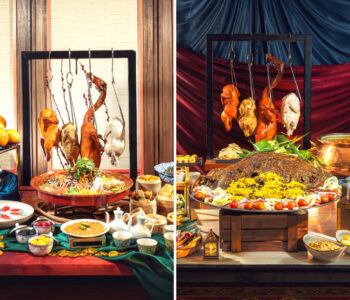When Yoke Darmawan travelled to Central Java in 2010 with a couple of friends, she found herself sitting on the top floor of the Borobudur temple, fascinated by the immense beauty of the monument and the storytelling behind the reliefs.
“Our imagination flew high picturing the life of the past, the life of our ancestors,” she recalls. “Borobudur is a unique artistic and philosophical expression of the Buddhist path to Enlightenment as the ultimate aim of life. Imagining the existence of our ancestors living around this gigantic monument, we felt an intense desire to celebrate this unique heritage in association with an eclectic gathering of writers, philosophers, scientists and performing artists. We think that people with a passion for the past civilizations of the Indonesian archipelago should get together, exchanging knowledge and communicating their awareness to a large audience.”
It was in this moment that the Borobudur Writers & Cultural Festival (BWCF) – at the time still called the Java Writers Festival – was born. Now in its fifth edition, the festival returns from October 5 to 8. What started as a small literary event has since developed into a full-fledged cultural festival. “From the first edition, our four-day festival has featured a series of happenings that are both educating and entertaining,” Yoke says. “Besides deliberating and gaining expertise in specific cultural matters, taking part in the BWCF also means dancing with the stars and reading poetry in nature.”
The upcoming edition of the festival will celebrate Serat Centhini, a compilation of Javanese tales and teachings, written in verses and first published 200 years ago in the close circle of the future Pakubowono V, Sultan of Surakarta. The entry point is both challenging and essential in view of today’s global issues: “After 200 Years, Serat Centhini: Eroticism and Religiosity in the Classic Scriptures of the Archipelago”. Award-winning Indonesian film director will attend the opening of the festival, whereas the closing night will feature the Sanghyang Kamahayanikan Award ceremony.
As in previous years, this prize will be awarded to an individual or a group of people having contributing greatly to the cultural and historical assessment of Indonesia. “Besides the main seminar and discussions with writers and publishers, this year’s schedule will be particularly rich and diversified with a book fair, short story writing workshops, poetry readings, film screenings, photo and painting exhibitions. The festival is also going to feature performing art from various regions of the archipelago,” Yoke explains. She adds that BWCF is different from other literary events throughout Indonesia, as it connects to the socio-cultural reality of its location.
BWCF serves as a meeting platform with only few formal procedures, where street writers and local artists have the chance to sit together and visit surrounding villages along with business sponsors and high-ranking officials, while the majestic Borobudur temple silently observes. “At a time when most of the visitors are coming to the heritage venue in hectic groups, shooting selfies and walking around fast and furiously, we hope that such a festival gives a higher meaning of Borobudur as a source of learning, cultural conservation and promotion as well as providing a sustainable, long-lasting impact to our day to day life,” Yoke says.
Register online at http://bit.ly/daftarbwcf16






